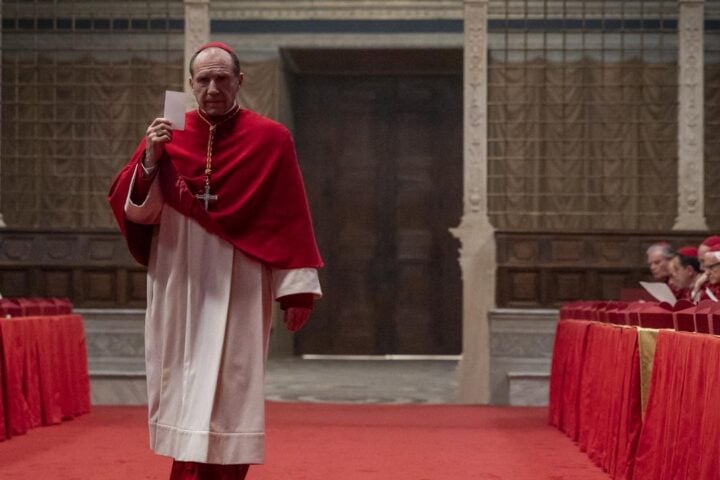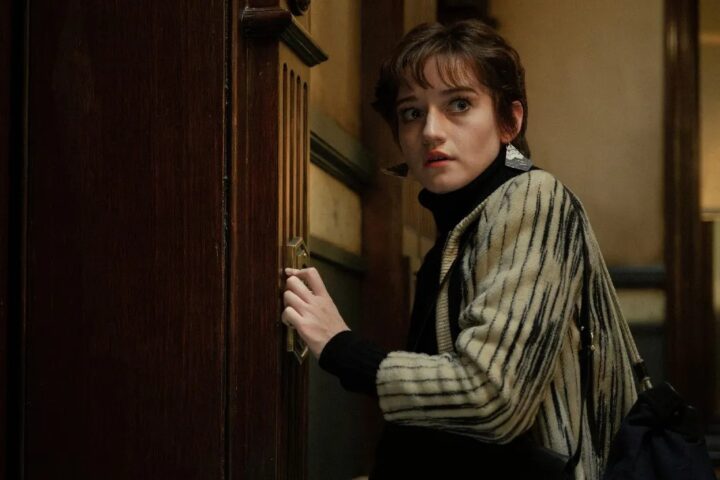An eventful week in the waning days of a medieval English village provides the narrative backbone for Harvest, Athina Rachel Tsangari’s moody-verging-on-mopish adaptation of Jim Crace’s novel of the same name. The book is written in a bewitching prose style somewhere between a monologue and a first-person essay. Dialogue is sparse, much of it denoted as overheard half-phrases, and the overall ambience alien, which is more than apt for a setting—a lord-of-the-manor-ruled agricultural collective—effectively lost to time.
Tsangari, who co-wrote the screenplay with Joslyn Barnes, finds her own way into this foreign land by accentuating the grit and the grime. This is evident in everything from Sean Price Williams’s grainy 16mm cinematography (some sort of crud is always visible at the edges of the frame) to the lead casting of Caleb Landry Jones, a performer who often seems like he’s just emerged dazed and confused from primordial sludge. In Harvest, Jones plays Walter Thirsk, a scatterbrained village manservant introduced walking the fields, swimming naked in an idyllic glade and, at one point, taking a hungry bite out of a loamy tree branch. It’s easy to see him as an avatar for Adam wandering Eden, which of course augurs an eventual exile.
The baleful signs and portents begin with an inferno, when the village barn is mysteriously incinerated. In the chaos, Thirsk’s hand is burned, rendering it mostly useless. Suspicion for the arson falls on a trio of strangers, Mistress Beldam (Thalissa Teixeira) and her male companions (Noor Dillan-Night and Gary Maitland). The gents are confined to the stocks in the town square (one of them eventually has their leg half-devoured by a ravenous hog), while the lady is shorn of her flowing locks and cast into the wilderness where she wanders with witchy abandon.
Problem not solved, for the general aura of paranoia and mistrust remains. And the villagers’ qualms are only exacerbated when the foppishly wealthy cousin, Master Jordan (Frank Dillane), of easily cowed landowner Master Kent (Harry Melling) arrives to ruthlessly modernize and monetize the community and its environs. From there, the twin forces of capital and the (seemingly) supernatural collude to send the village on a slow downward spiral to which Thirsk bears witness, alongside a cartographer, nicknamed Quill (Arinzé Kene), whose lovingly hand-crafted map of the area will prove to be an outdated relic before it’s even finished.
Has all the effort to cultivate a small corner of the Earth been for naught? Tsangari provides insight into her own perspective via an inspired addition to Crace’s fable: In a scene that wouldn’t be out of place in her aridly humorous Greek Weird Wave comedy Attenberg from 2011, a village elder takes the town children to the border and one after the other knocks their heads against a boulder. It’s a way of reminding them where they are, where they shouldn’t go past, and where they must remain in perpetuity. It also sets up the film’s darkly funny closing image, which retroactively raises the quality of much of what precedes.
A good deal of Harvest tends to the sluggish, recreating the basic incidents of Crace’s story without adeptly communicating Thirsk’s peculiarities of perspective. As compelling a presence as Jones can be, Thirsk remains grungily one-note, like a Malick cipher minus the whirling-dervish ineffability. Additionally, some shaky anachronisms—“Show’s over!” says one character after a violent display in the streets, and an “okay” hand gesture is used in vaguely intimidating fashion—may have you wondering if there’s a Shyamalan-esque twist in the offing.
If Tsangari was aiming for an Alex Cox-like subversiveness with such milieu-muddling moments, à la that director’s pugnacious Walker, it doesn’t at all come off. What we’re left with is a handsomely mounted production in which much of the filth feels stage-managed. The muck that the film requires, both spiritual and psychological, shouldn’t have its own dressing room.
Since 2001, we've brought you uncompromising, candid takes on the world of film, music, television, video games, theater, and more. Independently owned and operated publications like Slant have been hit hard in recent years, but we’re committed to keeping our content free and accessible—meaning no paywalls or fees.
If you like what we do, please consider subscribing to our Patreon or making a donation.






